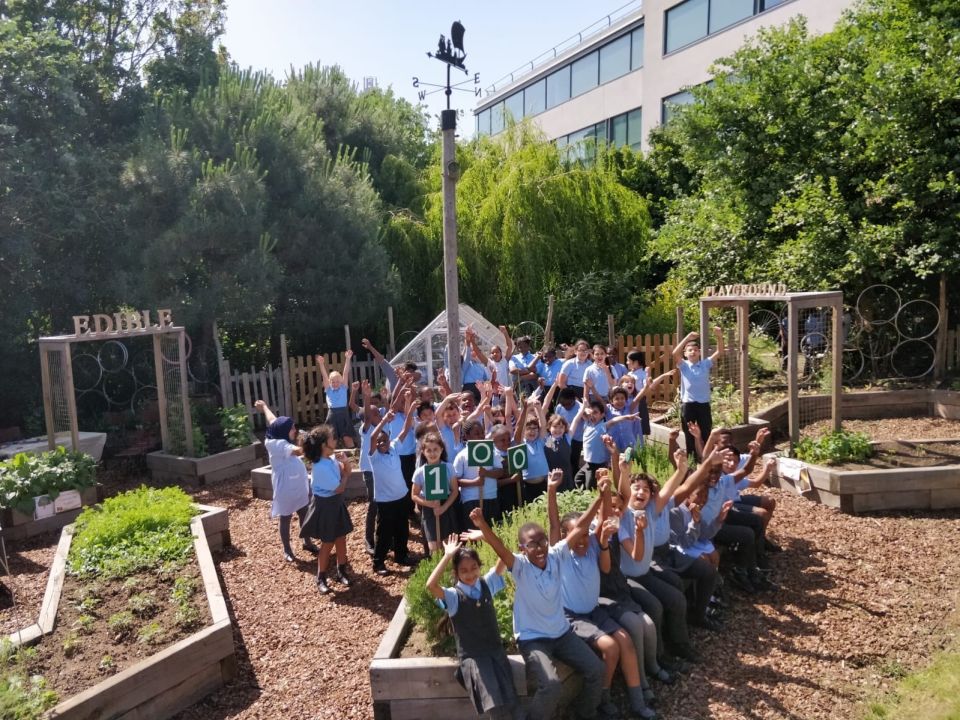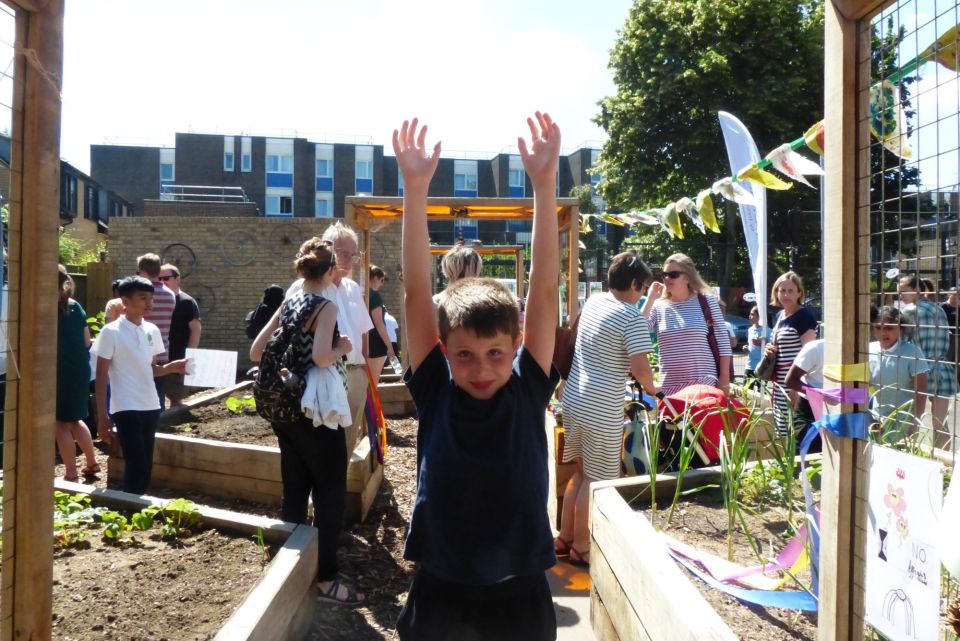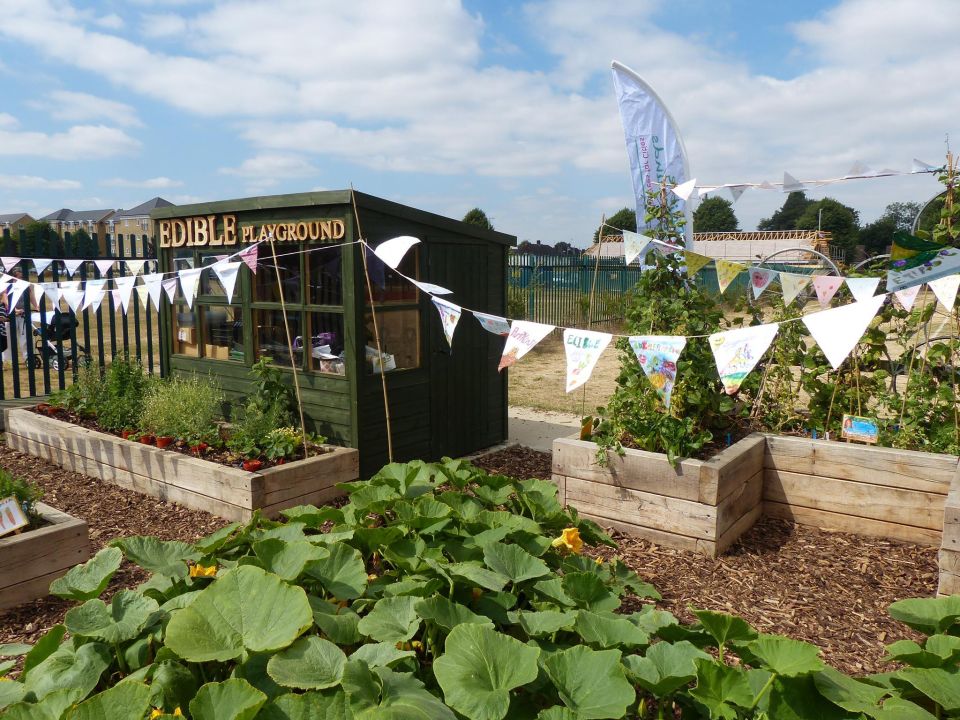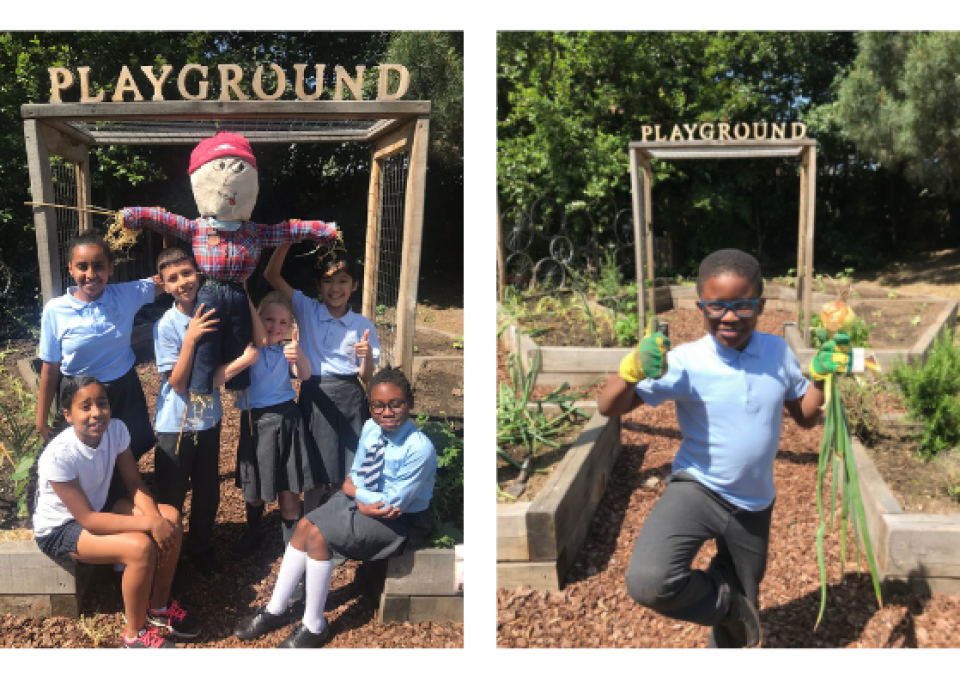100 Edible Playgrounds over 10 years – what have we learned?

Who would have thought a decade ago that this year we’d be celebrating the delivery of our 100th Edible Playground? What started off as tentative steps towards establishing food growing spaces in some of London’s deprived schools has blossomed into a hugely ambitious programme spreading across 12 UK towns and cities.
100 Edible Playgrounds built in the past decade: it seems the perfect time to take stock of what we’ve achieved.
Impact
Since we signed a partnership agreement with Islington’s Rockmount Primary in 2009, we’ve brought Edible Playgrounds to approximately 2,700 teachers, impacting around 68,000 pupils. The programme has evolved since those early days and we’ve made improvements on the design and delivery. For instance, we used to provide an irrigation system that we soon learned was ineffective: foxes kept chewing through it at night!
With the growth of the programme, we’ve expanded on what we offer our partners. As mentioned in April’s Tree Times, we now provide extensive educational resources to help teachers with their food growing journey, from lesson plans to curriculum guides, how-to guides and crop guides. Check them out here.

Feedback
So what’s our partner feedback been? We’ve gone back and spoken to a number of teachers from our historic projects to find out what their Edible Playground has brought to the school community, and if they can offer any tips for other schools thinking of undertaking a food growing programme.
Firstly, it’s been heart-warming to hear about the positive effects the programme has had on the wellbeing of both pupils and staff. Headteachers have told us how crucial the Edible Playground has been towards increasing the wellbeing of the school community. Tracey Langridge, Rockmount’s headteacher, told us:
“Once we noticed the impact it had on wellbeing, we enrolled on the Wellbeing Award for Schools programme and a big part of [our application] was food growing. It all came from the work we started with the Edible Playground as a whole school project on mental health. I believe it could not have happened without the garden as it’s so instrumental in getting everybody involved”.
We’ve also been told about how the behaviour of certain pupils, particularly those with behavioural challenges, has changed for the better. Paul Jackson, headteacber at Manorfield Primary School in Tower Hamlets, said:
The school was having low SATs results and poor behaviour. The Edible Playground gave us a focal point for overall school improvement and it had a huge impact on parental engagement and the children’s level of enthusiasm.
Paul Jackson, headteacher at Manorfield Primary School, Tower Hamlets

Best practice
Harsha Patel, currently headteacher at Dormers Wells Infant School in Southall, has been involved with a number of Edible Playgrounds, as she was also the headteacher at both Havelock and Copenhagen Primary when we were partnered with them 8 and 5 years ago respectively. She offered some sage advice to schools thinking of building a food growing space: “I chose a teacher to be an outdoor learning champion and also developed champions from the SLT team, teaching assistants, pupils, parents and a governor. We have a whole school growing cycle which is part of the school diary, meaning everyone is involved”.
This idea of integration has proven to be so important, with the schools who ensured the Edible Playground is written into staff job roles being the ones who get the most from the project in the long term.
Yvonne Morris, the higher level teaching assistant at Hitherfield Primary School, also offered some good advice to schools thinking of growing their own fruit and veg: “Don’t go too big too soon. Start growing a few things and see how you get on”.
We couldn’t agree more. If you’re unsure, start small and get a good grasp of gardening. See what it brings to the school and expand when you’re ready. Little and often beats working in fits and starts.
Whatever happens though, if you’re a parent or a member of school staff, do encourage the school to get the children outside regularly to learn. They get so much from the experience. As Harsha Patel puts it:
Edible Playgrounds develop young minds with life skills that support them to be global citizens. The children learn how they have the greatest power to make choices that will transform the whole planet and their own health and well-being.
Harsha Patel, headteacher at Dormers Wells Infant School, Southall

100th Celebration!
To celebrate our milestone, we ran an event at St Mark’s Church of England Primary School in Lambeth. Their Edible Playground was the 100th that we delivered, so it was fitting that we should celebrate with them. The team ran some activity workshops, making a scarecrow with pupils from Year 5 and painting some vegetable markers with Year 2. Sola Ingram, headteacher at St Mark’s, said: “it’s been wonderful to see the Edible Playground before our eyes, and the whole school community is really looking forward to learning and playing in it. Anything that can get our pupils, or any children excited about healthy eating is great! We’re excited to be the 100th Edible Playground, and look forward to seeing countless more schools get involved in the programme.”
As part of the fun, keep an eye out on our social channels for our exciting updates. We will soon be releasing an impact report and a promotional film, plus we’re currently holding a photography competition open to all UK primary and secondary schools. Check it out here.
Looking ahead
As we look towards the future, we have ambitious plans to expand the programme across the UK. In 2019/20 alone we are aiming to complete 50 projects – a big step up from the 30 of 2018/19 – across a number of towns and cities including Bradford, West Bromwich, Nottingham and Newcastle. With aims to become the go-to source for information about food growing in schools, we will continue to provide functional teacher-focused resources about how best to incorporate food growing into the curriculum.
Here’s to the next 100 projects!
Figures are derived from pupil populations and teacher numbers from Gov.uk
Donate to Trees for Cities and together we can help cities grow into greener, cleaner and healthier places for people to live and work worldwide.
Donate